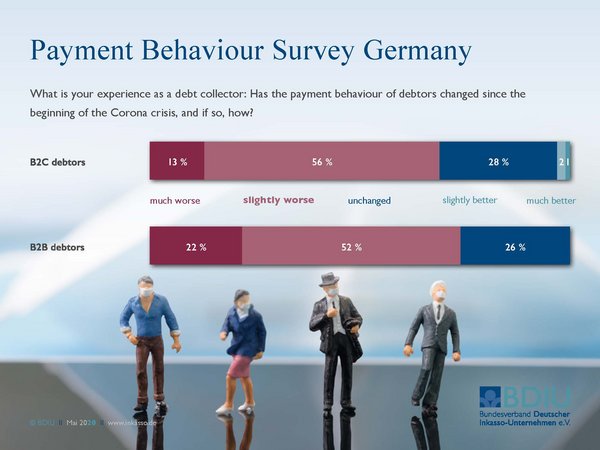As many as 83 per cent of the BDIU companies surveyed report that private debtors are currently unable to pay because of short-time working. As recently as November, in the previous survey, this reason for non-payment did not play a role at all. In addition, 65 percent of those surveyed stated that defaulting consumers suffered from a liquidity bottleneck that was only triggered by the Corona crisis.
"Millions of employees currently lack the income to be able to pay all their bills reliably and on time," is how Kirsten Pedd, President of the Federal Association of German Debt Collection Agencies (BDIU), describes the situation. "As a result, more and more companies are facing defaulting customers."
It is precisely those companies whose business activities are already massively restricted by the lockdown that suffer most. 64 percent of the collection companies cite the sports and leisure industry, especially fitness studios, as a severely affected sector. In second and third place come restaurants and the hotel industry. The changes are particularly drastic here. In November, only 7 percent of the collection companies reported that hotels had problems with customer billing - now 56 percent, eight times as many.
In addition, liquidity bottlenecks triggered by the crisis (86 percent according to the survey) are causing payments to falter in B2B transactions as well. And 69 percent of the collection companies observe that commercial debtors are suffering from payment defaults by their own customers.
Not enough business orders (48 percent) and a lack of equity (41 percent) are also currently relevant reasons for non-payment by commercial debtors. "These liquidity problems cause domino effects," warns Kirsten Pedd, "which can spread rapidly along supply chains. Tens of thousands of companies are threatened with insolvency in the coming months.” In the survey, 96 percent of the collection service providers expect significantly more company bankruptcies by the end of the year.
The head of the association fears that this could be just the beginning of a longer crisis. In order to overcome it, responsible action is required - the debt collection industry is also called upon to act. For example, many debtors are currently reporting to the collection companies with the information that they cannot pay because of the Corona crisis. The legal service providers are called upon, Pedd emphasises, to react with tact and sensitivity and to make appropriate concessions.
"In such cases, it is possible, for example, to postpone payments, agree deferrals or instalments or adjust the amount of existing instalments," explains Pedd. It is important to approach each other. "My motto is: Talking helps. Anyone who cannot pay should explain the reasons and be open and cooperative. Responsible debt collection makes a significant contribution to maintaining the economic cycle."




